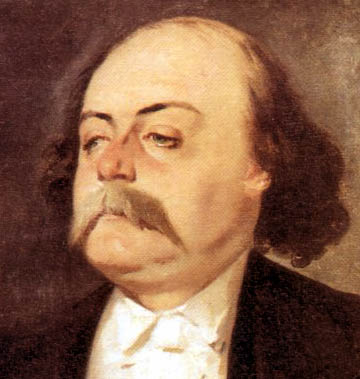Traditionally, reader response theory focuses on abstract or generic readers and tends to brush over some of the more human elements of reading. This includes the reader’s relationship to the author, and so it is quite refreshing to read an account of just such a relationship: Julian Barnes Flaubert’s Parrot recounts the story of Geoffrey Braithwaite, an avid reader and amateur-scholar of Gustave Flaubert, who is visiting the writer’s home in France to search for clues about the significance of a parrot Flaubert once used to write one of his stories.
Barnes’s Parrot has a lot to say on authors and readers, and on critics, too. Neither Flaubert nor Braithwaite make bones about what they think of the latter’s breed. In a chapter on Emma Bovary’s eyes, for example, the amateur-reader Braithwaite takes a professional Flaubert critic to task for chiding the Frenchman for sloppiness, and offers a poignant simile of the reader-author relationship for the professional reader, on the one hand, and the common readers on the other:
I must confess that in all the time I read Madame Bovary, I never noticed the heroine’s rainbow eyes. Should I have? Would you? Was I perhaps too busy noticing things that Dr Starkie was missing (though what they might have been I can’t for the moment think)? Put it another way: is there a perfect reader somewhere, a total reader? Does Dr Starkie’s reading of Madame Bovary contain lal the responses which I have when I read the book, and then add a whole lot more, so that my reading is in a way pointless? Well, I hope not. My reading might be pointless in terms of the history of literary criticism; but it’s not pointless in terms of pleasure. I can’t prove that lay readers enjoy books more than professional critics; but I can tell yo one advantage we have over them. We can forget. Dr Starkie and her kind are cursed with memory: the books they teach and write about can never fade from their brains. They become family. Perhaps this is why some critics develop a faintly patronising tone towards their subjects. They act as if Flaubert, or Milton, or Wordsworth were some tedious old aunt in a rocking chair, who smelt of stale powder, was only interested in the past, and hadn’t said anything new for years. … Whereas the common but passionate reader is allowed to forget; he can go away, be unfaithful with other writers, come back and be entranced again. (75-76)
Very apt, methinks, although we should not forget that common readers can get quite obsessed and obsessive about their choice authors as well.

The Parrot also contains snippets from Flaubert’s letters and Madame Bovary that often broach the topic of reading, and make me want to read Flaubert, albeit not so much for the master’s portrayal of the human condition as for what doctor Braithwaite dubs Flaubert’s “confident scraps of wisdom, hand-me-down summaries for those in a hurry”. To wit:
Les livres ne se font pas comme les enfants, mais comme les pyramides, avec un dessein prémédité, et en apportant des grands blocs l’un par-dessus l’autre, à force de reins, de temps et de sueur, et ça ne sert à rien ! Et ça reste dans le désert ! Mais en le dominant prodigieusement. Les chacals pissent en bas et les bourgeois montent dessus, etc., continue la comparaison. (Gustave Flaubert, cited in Albert Thibaudet’s Gustave Flaubert, 136)
Or in translation from the Parrot:
Books aren’t made the way babies are: they are made like pyramids. There’s some long-pondered plan, and then great blocks of stone are placed one on top of the other, and it’s back-breaking, sweaty, time-consuming work. And all to no purpose! It just stands like that in the desert! But it towers over it prodigiously. Jackals piss at the base of it, and bourgeois clamber to the top of it, etc. Continue this comparison.
Magnifique!
Have you ever considered about adding a little bit more than just your articles?
I mean, what you say is fundamental and all. Nevertheless think of if you added some great pictures or videos to
give your posts more, “pop”! Your content is excellent but with images and videos,
this website could certainly be one of the greatest in its niche.
Excellent blog!